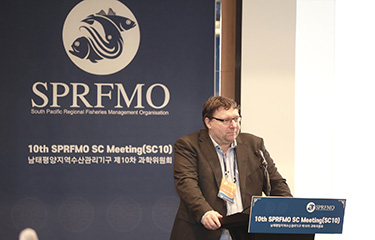China has used the South Pacific Regional Fisheries Management Organization’s consensus-based decision-making mechanism to block the listing of two Zhoushan-based fishing vessels on SPRFMO’s illegal, unreported, and unregulated (IUU) fishing blacklist.
At the most-recent SPRFMO meeting from 13 to 17 February, 2023, in Manta, Ecuador, the United States introduced a motion to add the Zhou Yu 929, operated by Zhoushan Putuo Deep-Sea, and the Pu Yuan 755, operated by CNADC Zhoushan Overseas, to the SPRFMO’s Provisional IUU Vessel List.
Both squid-fishing vessels refused to allow an at-sea boarding and inspection while operating near Ecuador’s Galapagos Islands, inside waters regulated by the SPRFMO, in the summer of 2022, resulting in a standoff and a near-collision between one of the fishing vessels and the U.S. Coast Guard cutter James. The high-seas confrontation represented a potentially dangerous breach of international maritime protocol, one the U.S. sees as a troubling precedent since it happened on the Coast Guard’s first-ever mission to counter illegal fishing in the eastern Pacific.
The confrontation, along with two other completed boardings, resulted in an escalation of diplomatic tensions between the U.S. and China, with the filing from Beijing objecting to the attempted boardings.
In draft minutes from the SPRFMO compliance and technical committee meeting, which took place 7 to 10 February, 2023, China said the vessels were told not to allow the Americans to board, even though the organization has had rules on the books for years allowing any country to inspect another convention-member's ship.
“China expressed its appreciation for efforts of the United States and noted that there was a common interest to fight IUU fishing activities but explained that in its view, that there could not be a compliance issue because [China] is not a contracting party to 1995 U.N. Fish Stocks Agreement and there was no procedure to conduct inspections in the SPRFMO area. Thus, the [U.S.] was not legally authorized to conduct [high-seas boarding and inspection] activity,” according to the minutes.
But the U.S. said it was authorized by a unanimous agreement on rules adopted by the RFMO in 2011 to operate under the Fish Stocks Agreement. It also said its inspection vessels did not need to be registered with the SPRFMO, as China insisted, but said it would do so to enable future inspections if the RFMO created such a registry.
The report shows many of the SPRFMO’s 16 members "strongly disagreed" with China.
“They agreed that the United States may conduct boarding and inspection activities in the convention area under the current [conservation and management measures]. These members supported the inclusion of these vessels on the Provisional IUU List,” the minutes read.
Nonetheless, neither vessel was blacklisted because, like all regional fishing organizations, the SPRFMO operates on consensus, giving any member a virtual veto.
China has repeatedly blocked efforts to strengthen inspection procedures in the South Pacific. The most recent stonewalling took place last year, when China argued that fishermen would be at risk if at-sea patrols were allowed to carry firearms, which the U.S. and other SPRFMO members argue are allowed under Fish Stocks Agreement language that enables inspectors to take measures to ensure safety.
At its most-recent meeting, the SPRFMO Commission approved an updated boarding and inspection measure “which is more detailed and comprehensive and provides SPRFMO specific procedures, replacing the current measure.”
“In light of this important step and, as a result, compliance with CMM 11-2015 [Conservation and Management Measure Relating to Boarding and Inspection Procedures in the SPRFMO Convention Area] would not be an ongoing concern. Members were willing to not take an assessment decision for China against this obligation,” its minutes read.
Currently, there are zero vessels on the SPRFMO’s IUU Vessel List, even though there is a list of 168 IUU-connected fishing vessels operating globally compiled by Global Fishing Watch and Norway-based nonprofit organization Trygg Mat Tracking. Many of those vessels are linked to Chinese fishing companies operating in the South Pacific and elsewhere within SPRFMO-regulated waters.
Zhoushan Putuo Deep-Sea has a fleet of ...
Photo courtesy of South Pacific Regional Fisheries Management Organization








